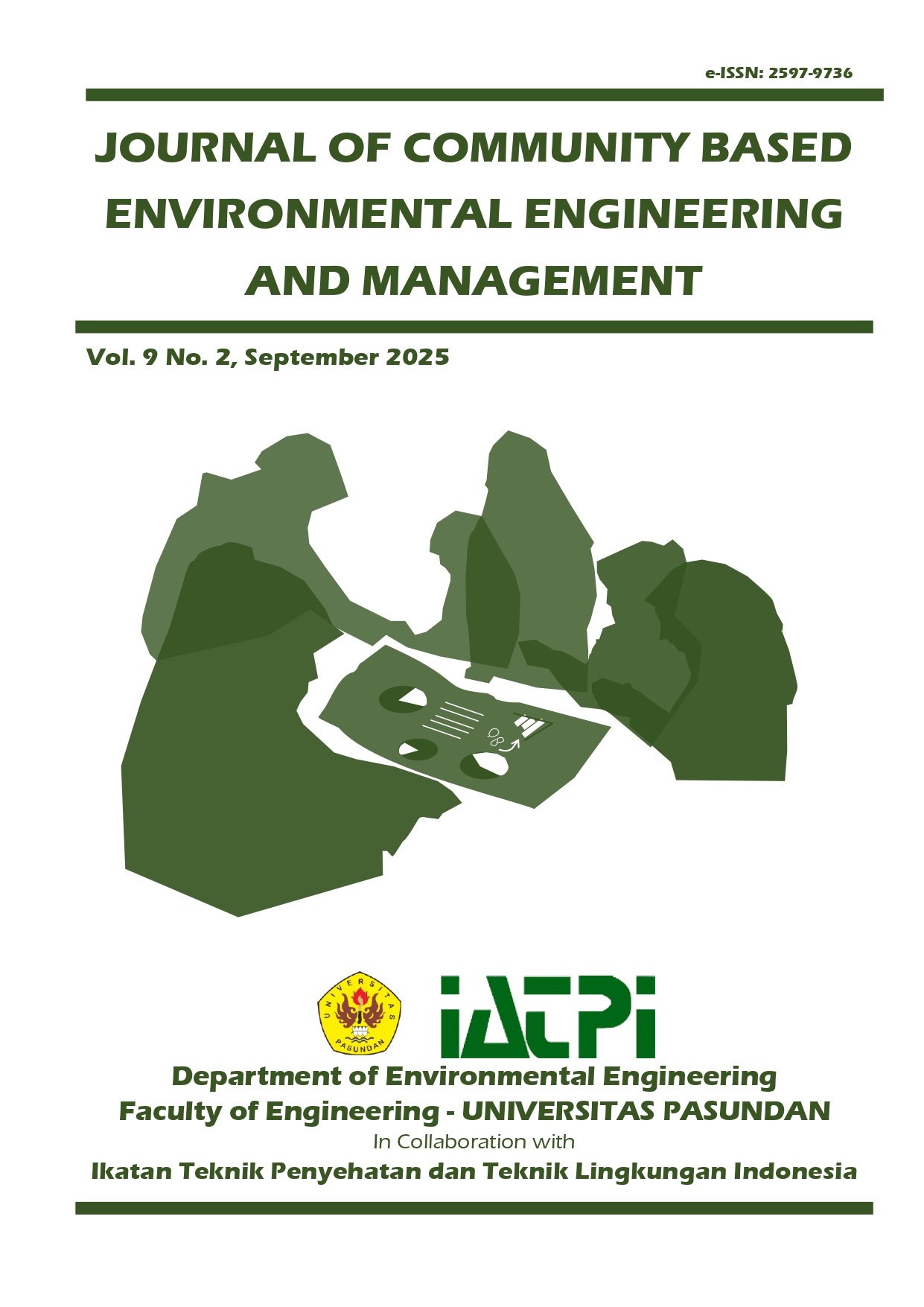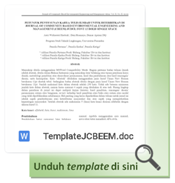Assessing the Cause of Food Waste Behavior of Consumers at Food Courts in Banyumas, Indonesia: Intention to Reduce Food Waste as a Mediator
DOI:
https://doi.org/10.23969/jcbeem.v9i2.30948Keywords:
consumer behavior, food choice, food court, food literacy, food wasteAbstract
Food waste is a global hindrance to sustainable food systems. In Indonesia, a lot of food suitable for consumption is wasted annually. In 2023, Banyumas Regency was dominated by the most significant portion of food waste, with a daily volume of 541.80 tons. Food waste comes from hotels, restaurants, and trade sectors, such as food court areas. Therefore, this study aims to analyze factors influencing consumers' food waste behavior at food courts in Banyumas Regency. The method used was quantitative, with 410 respondents, and this research employed structural equation modeling-partial least squares (SEM-PLS). The factors influencing food waste generation include food choice, food literacy, social influence and normative behavior, food ordering routine, intention to reduce food waste, and food waste behavior. The results show that food choice and food literacy have a significant relationship with intention to reduce food waste (IR), and IR has a significant relationship with food waste behavior (FWB). The result also shows that IR mediates the relationship between Food choice (FC) and FWB, and IR mediates the relationship between food literacy (FL) and FWB. Food choice and literacy play a significant role in shaping the intention to reduce food waste. This contributes to the literature on avoiding food waste behavior by emphasizing the importance of cognitive (food knowledge) and affective (food preferences) influences on changing more sustainable consumption behavior. The food court manager can develop visual campaigns in the area, train consumers, and provide flexible food portions that suit customer needs to minimize food waste.
Downloads
References
Ajzen, I. (1991). The theory of planned behavior. Organizational Behavior and Human Decision Processes, 50(2), 179–211. https://doi.org/10.1016/0749-5978(91)90020-T
Aktas, E., Sahin, H., Topaloglu, Z., Oledinma, A., Huda, A. K. S., Irani, Z., Sharif, A. M., van’t Wout, T., & Kamrava, M. (2018). A consumer behavioural approach to food waste. Journal of Enterprise Information Management, 31(5), 658–673. https://doi.org/10.1108/JEIM-03-2018-0051
Aloysius, N., Ananda, J., Mitsis, A., & Pearson, D. (2025). The Last Bite : Exploring behavioural and situational factors influencing leftover food waste in households. Food Quality and Preference, 123(August 2024), 105327. https://doi.org/10.1016/j.foodqual.2024.105327
Aprilia, P. D. (2022). Tinjaun terhadap Food Waste berdasarkan Teori Bioregionalisme Richard Evanoff dan Segitiga Steiner-Evanoff-UKDW. Integritas: Jurnal Teologi, 4(2), 137–149.
Arifianto, P. F., & Nofrizaldi, N. (2020). Komunikasi Visual Kuliner Banyumas sebagai Media Pendukung City Branding “Better Banyumas.” ANDHARUPA: Jurnal Desain Komunikasi Visual & Multimedia, 6(1), 63–72. https://doi.org/10.33633/andharupa.v6i1.2733
Aschemann-Witzel, J., de Hooge, I., Amani, P., Bech-Larsen, T., & Oostindjer, M. (2015). Consumer-related food waste: Causes and potential for action. Sustainability (Switzerland), 7(6), 6457–6477. https://doi.org/10.3390/su7066457
Aydin, A. E., & Yildirim, P. (2021). Understanding food waste behavior: The role of morals, habits and knowledge. Journal of Cleaner Production, 280, 124250. https://doi.org/10.1016/j.jclepro.2020.124250
Bhatti, S. H., Saleem, F., Zakariya, R., & Ahmad, A. (2023). The determinants of food waste behavior in young consumers in a developing country. British Food Journal, 125(6), 1953–1967. https://doi.org/10.1108/BFJ-06-2019-0450
Coşkun, A., & Özbük, R. M. Y. (2020). What influences consumer food waste behavior in restaurants? An application of the extended theory of planned behavior. Waste Management, 117, 170–178. https://doi.org/10.1016/j.wasman.2020.08.011
Cozzio, C., Schäufele-Elbers, I., & Maurer, O. (2024). Empowering tomorrow: Nurturing young tourists to lower food waste. Annals of Tourism Research Empirical Insights, 5(2). https://doi.org/10.1016/j.annale.2024.100156
Dafa, A. M., Surakarta, S. A., & Widiati, S. (2024). Penerapan Metode Design Thinking pada UI / UX Website SaveBite untuk Penjualan Sisa Makanan dalam Mengurangi Food Waste. Router: Jurnal Teknik Informatika Dan Terapan, 2(3).
Daniszewski, K. (2016). Opinions and behaviours contributing to household level food waste in Langley [Simon Fraser University]. https://summit.sfu.ca/item/16593
Divito, D. M., Budi, A. S., & Setiawan, E. (2022). Implementasi Finite State Machine pada Sistem Notifikasi Pesanan Food. Jurnal Pengembangan Teknologi Informasi Dan Ilmu Komputer, 6(7), 3247–3253.
Farahdiba, A. U., Warmadewanthi, I. D. A. A., Fransiscus, Y., Rosyidah, E., Hermana, J., & Yuniarto, A. (2023). The present and proposed sustainable food waste treatment technology in Indonesia: A review. Environmental Technology and Innovation, 32, 103256. https://doi.org/10.1016/j.eti.2023.103256
Filimonau, V., Fidan, H., Alexieva, I., Dragoev, S., & Marinova, D. D. (2019). Restaurant food waste and the determinants of its effective management in Bulgaria: An exploratory case study of restaurants in Plovdiv. Tourism Management Perspectives, 32(September). https://doi.org/10.1016/j.tmp.2019.100577
Graham-Rowe, E., Jessop, D. C., & Sparks, P. (2014). Identifying motivations and barriers to minimising household food waste. Resources, Conservation and Recycling, 84, 15–23. https://doi.org/10.1016/j.resconrec.2013.12.005
Hair, J. F., Howard, M. C., & Nitzl, C. (2020). Assessing measurement model quality in PLS-SEM using confirmatory composite analysis. Journal of Business Research, 109, 101–110. https://doi.org/https://doi.org/10.1016/j.jbusres.2019.11.069
Handayani, S. (2023). Kabupaten Banyumas Dalam Angka 2023. In Badan Pusat Statistika Kabupaten Banyumas (Ed.), BPS Kabupaten Banyumas. BPS Kabupaten Banyumas.
Hartini, D. A., Kusumawati, D. E., Bahja, B., Dewi, N. U., & Aiman, U. (2023). Analisis Faktor yang Mempengaruhi Pemilihan Makanan pada Remaja dengan Status Gizi Normal dan Tidak Normal di Kota Palu. Ghidza: Jurnal Gizi Dan Kesehatan, 7(2), 174–183. https://doi.org/10.22487/ghidza.v7i2.959
Ibtiyah, A. K., Romadlon, F., & Nurisusilawati, I. (2023). Emphasizing Food Expenditure as a Food Waste Mitigation Initiative at Restaurants in Banyumas, Indonesia. Habitat, 34(3), 299–310. https://doi.org/10.21776/ub.habitat.2023.034.3.27
Ilmi, R. A. (2019). Hubungan Terpaan Kampanye Food Waste dan Sikap terhadap Perilaku Mengurangi Pembuangan Makanan dengan Minat Mengurangi Pembuangan Makanan. Jurnal Interaksi Online, 7(4), 202–214.
Iriyadi, Setiawan, B., & Puspitasari, R. (2023). Consumer intentions to reduce food waste in all-you-can-eat restaurants based on personal norm activation. Heliyon, 9(2), e13399. https://doi.org/10.1016/j.heliyon.2023.e13399
Janmaimool, P., Chudech, S., Khajohnmanee, S., & Chontanawat, J. (2024). Communicating norms to increase food delivery customers’ sustainable waste management behaviors. Future Foods, 9(September 2023), 100288. https://doi.org/10.1016/j.fufo.2023.100288
Jia, L., Zhang, Y., & Qiao, G. (2022). Consumer-Related Antecedents of Waste Behavior in Online Food Ordering: A Study among Young Adults in China. Foods, 11(19), 1–19. https://doi.org/10.3390/foods11193098
Lestari, S. C., & Halimatussadiah, A. (2022). Kebijakan Pengelolaan Sampah Nasional: Analisis Pendorong Food Waste di Tingkat Rumah Tangga. Jurnal Good Governance. https://doi.org/10.32834/gg.v18i1.457
Li, C., Bremer, P., Jowett, T., Lee, M. S. W., Parker, K., Gaugler, E. C., Mirosa, M., Li, C., Bremer, P., Jowett, T., Lee, M. S. W., & Parker, K. (2024). What influences consumer food waste behaviour when ordering food online ? An application of the extended theory of planned behaviour. Cogent Food & Agriculture, 10(1). https://doi.org/10.1080/23311932.2024.2330728
Lisciani, S., Camilli, E., & Marconi, S. (2024). Enhancing Food and Nutrition Literacy: A Key Strategy for Reducing Food Waste and Improving Diet Quality. Sustainability (Switzerland) , 16(5). https://doi.org/10.3390/su16051726
Liu, H., Gómez-Miñambres, J., & Qi, D. (2022). Menu-dependent food choices and food waste. Resources, Conservation and Recycling, 176. https://doi.org/10.1016/j.resconrec.2021.105919
Ningsih, K., Sustiyana, S., & Mahtumia, M. (2023). Estimasi Nilai Ekonomis Sisa Makanan Melalui Pendekatan Perilaku Konsumen. JSEP (Journal of Social and Agricultural Economics), 16(1), 81. https://doi.org/10.19184/jsep.v16i1.36412
Oehman, J. M., Babbitt, C. W., & Carli, F. (2024). What predicts and prevents source separation of household food waste? An application of the theory planned behavior. Https://Www.Sciencedirect.Com/Science/Article/Pii/S0921344922003354.
Park, J., Bonn, M. A., & Cho, M. (2020). Sustainable and religion food consumer segmentation: Focusing on korean temple food restaurants. Sustainability (Switzerland), 12(7). https://doi.org/10.3390/su12073035
Pua, A. E., & Renyoet, B. S. (2022). Studi Literature Review: Faktor-Faktor yang Mempengaruhi Food Choice Pada Remaja Pasca Pandemik COVID-19. Jurnal Kesmas Jambi, 6(1), 1–8. https://doi.org/10.22437/jkmj.v6i1.16754
Qornaeni, L., Romadlan, F., & Dwi Winati, F. (2024). Examining Food Literacy and Anti-Food Waste Behaviour to Support Food Smart City Initiative : Household Routine as a Mediator. 2024 International Conference on ICT for Smart Society (ICISS), September, 1–6. https://doi.org/10.1109/ICISS62896.2024.10751107
Risdiyanto, C. F., Inan, D. I., Wurarah, R. N., & Fenetiruma, O. A. (2024). Analisis Faktor-faktor Pendukung dan Penghambat Beralih Mengadopsi Mobile Banking di Papua Barat Memanfaatkan PLS-SEM dan Perspektif Status Quo Bias. MALCOM: Indonesian Journal of Machine Learning and Computer Science, 4(2), 637–646. https://doi.org/10.57152/malcom.v4i2.1289
Rizkiawan, I. K., Aisah, N., & Utomo, F. H. (2024). Norma subjektif dan sikap dalam mendorong minat beli generasi milenial terhadap organic food. Journal of Management and Digital Business, 4(3), 529–543.
Salins, M., & Aithal, P. S. (2023). Consumers’ Intention toward Mitigation of Plate Waste Behaviour in Restaurants – Development of Conceptual Model. International Journal of Management, Technology, and Social Sciences, 8(2), 190–230. https://doi.org/10.47992/ijmts.2581.6012.0279
Setiawan, B., & Puspitasari, R. (2023). Heliyon Consumer intentions to reduce food waste in all-you-can-eat restaurants based on personal norm activation. Heliyon, 9(2), e13399. https://doi.org/10.1016/j.heliyon.2023.e13399
Siaputra, H., Chealsea, N., & Angela, M. (2022). Pengaruh konsumsi makanan generasi Z terhadap niat untuk pengurangan limbah makanan restoran di Surabaya. Jurnal Manajemen Perhotelan, 8(1), 14–25. https://doi.org/10.9744/jmhot.8.1.14
Simpson, B., Mesler, R. M. D., & White, K. (2024). Perceiving less but wasting more: The relationship between perceived resource scarcity and consumer food waste. Appetite, 202. https://doi.org/10.1016/j.appet.2024.107642
SIPSN. (2023). Sistem Informasi Pengelolaan Sampah Nasional. SIPSN. https://sipsn.menlhk.go.id/sipsn/
Sitompul, C., Gunawan, T., Mesiranta, N., Närvänen, E., & Octavia, J. R. (2025). Impact of food waste-related course attendance on students’ food waste reduction behaviours and knowledge: a case study from Indonesia. International Journal of Sustainability in Higher Education, 26(9), 36–54. https://doi.org/10.1108/IJSHE-04-2024-0244
Stancu, V., Haugaard, P., & Lähteenmäki, L. (2016). Determinants of consumer food waste behaviour: Two routes to food waste. Appetite, 96, 7–17. https://doi.org/10.1016/j.appet.2015.08.025
Talwar, S., Kaur, P., Ahmed, U., Bilgihan, A., & Dhir, A. (2023). The dark side of convenience: how to reduce food waste induced by food delivery apps. British Food Journal, 125(1), 205–225. https://doi.org/10.1108/BFJ-02-2021-0204
Talwar, S., Kaur, P., Yadav, R., Sharma, R., & Dhir, A. (2023). Food waste and out-of-home-dining: antecedents and consequents of the decision to take away leftovers after dining at restaurants. Journal of Sustainable Tourism, 31(1), 47–72. https://doi.org/10.1080/09669582.2021.1953512
Teng, C. C., Wang, Y. C., & Chuang, C. J. (2022). Food choice motives and dining-out leftover prevention behavior: Integrated perspectives of planned behavior and norm activation. International Journal of Hospitality Management, 107(June), 103309. https://doi.org/10.1016/j.ijhm.2022.103309
Teoh, C. W., Koay, K. Y., & Chai, P. S. (2022). The role of social media in food waste prevention behaviour. British Food Journal, 124(5), 1680–1696. https://doi.org/10.1108/BFJ-04-2021-0368
Timoty, N. S., & Yuliati, L. N. (2022). Peningkatan Kesadaran Masyarakat Dalam Pengurangan Food Waste Untuk Membentuk Cinta Lingkungan (Vol. 4, Issue 2). https://journal.ipb.ac.id/index.php/agro-maritim/article/view/53684
van der Werf, P., Seabrook, J. A., & Gilliland, J. A. (2019). “Reduce Food Waste, Save Money”: Testing a Novel Intervention to Reduce Household Food Waste. Environment and Behavior. https://doi.org/10.1177/0013916519875180
Vizzoto, F., Testa, F., & Iraldo, F. (2021). Strategies to reduce food waste in the foodservices sector: A systematic review. International Journal of Hospitality Management, 95(April), 102933. https://doi.org/10.1016/j.ijhm.2021.102933
Werf, P. Van Der, Seabrook, J. A., & Gilliland, J. A. (2019). “ Reduce Food Waste , Save Money ”: Testing a Novel Intervention to Reduce Household Food Waste. https://doi.org/10.1177/0013916519875180
West, E. G., Lindberg, R., Ball, K., & McNaughton, S. A. (2020). The role of a food literacy intervention in promoting food security and food literacy—ozharvest’s nest program. Nutrients, 12(8), 1–24. https://doi.org/10.3390/nu12082197
Yong, K., Lee, M., Ling, P., Ling, L., Shen, Y., Huei, G., Chiu, M., & Phang, X. (2024). Food waste separation intention among the residential students : Moderation role of university support. Cleaner Waste Systems, 9(October), 100174. https://doi.org/10.1016/j.clwas.2024.100174














